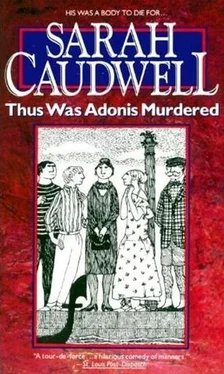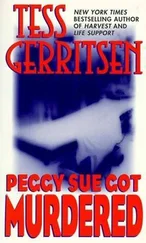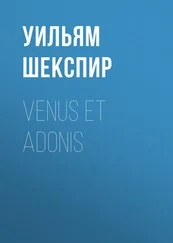“Congratulations, Hilary,” said Selena. “You seem to have guessed right.”
“My dear Selena,” I said, “the careful process of reasoning by which the Scholar advances from established premise to ineluctable conclusion is hardly to be described as guesswork.”
“My dear Hilary,” she said, “of course it was guesswork. The painting might have been stolen by anyone — well, anyone who was in Verona on that day.”
“I do not dispute,” I said, “that there would have been a large number of people in Verona on Tuesday of last week. Among them, however, I suspect there were only three who believed that the Church of Saint Nicholas there contained a Madonna by the younger Tiepolo. And two of them were talking about Catullus.”
I picked up again the guide book brought by Marylou and turned to the passage I had been reading when Cantrip returned from his telephone call. “It is a misapprehension, you see, likely to be entertained only by someone going round Verona with the assistance of a guide book to Padua.”
There was a brief silence, which ended with Selena saying, “Nonsense, Hilary. Julia did very well in Verona.”
I read to them the paragraph in the guide book to Padua in which reference was made to the Madonna by Tiepolo in the Church of Saint Nicholas. Then I picked up the guide to Verona, still lying on Ragwort’s desk, and read them the description of the Church in that city dedicated to the same Saint — it made no mention of any work by that particular Great Master. I spread out the maps folded inside the cover of each guide book, pointing out that in each case the name of the town was shown only on the upper right-hand corner, so as to be invisible if the map were folded for convenient study of the central portion. I showed them how easily the blue line which represented the canal half-encircling Padua could be taken to represent the river which embraces in similar manner the city of Verona. I demonstrated that every street, square and building identified by Julia in Verona with the aid of her guide book had its counterpart in Padua.
Selena, for some reason, was rather put out about it all. Julia, she said, had been doing her best; if the Italians were so inconsiderate as to call all the streets by the same names in different towns, that was not Julia’s fault; if people were foolish enough to treat her casual remarks as the cornerstone for a full-scale art robbery, still less was that Julia’s fault.
“Furthermore,” she went on, apparently regarding me as in some way to blame, “whatever you say, Hilary, it was still pure guesswork. Until you saw the guide book to Padua this morning, the whole idea was the merest conjecture.”
“By no means,” I said. “It was always, at the very least, highly probable. My dear Selena, let us be a little realistic. If one sends Julia off to Italy with four guide books, all wrapped in brown paper covers, what are the odds against her having the right one in the right place every time?”
“Oh really,” said Ragwort. “One knows, of course, that Julia is a complete half-wit, but even so—”
“I don’t think you should talk that way about Julia, Mr. Ragwort,” said Marylou, her customary diffidence qualified by indignation. “Julia is a very intelligent and highly educated person.”
“Quite so,” I said. “With a dim and illiterate halfwit the odds against are about 250 to 1. With a highly intelligent and educated half-wit such as Julia they are astronomical. I thought from the start that there was something unnatural about Julia’s success in Verona. And on Monday I realized that it must have been the wrong guide book. Julia, you will recall, was using in Verona a guide book written in Italian. But on Monday, when Marylou brought back the guide to Verona which Julia had lent her, you picked it up, Selena, and read from it, quite easily and without hesitation, an account of communications between that city and Venice. Remembering that your many talents do not include any fluency in Italian, I knew without even looking at it that it was not the one Julia had been using in Verona.”
“Oh,” said Selena. There was a further silence. “I’m sorry, I guess I’m a little confused,” said Marylou. “Is it your hypothesis, Professor Tamar, that Major Linnaker stole a painting because Julia had used the wrong guide book?”
“It is our view,” said Ragwort — the principle of giving credit where it is due has few adherents in Lincoln’s Inn—“that Major Linnaker was responsible for the theft of a painting reported stolen last week from the Church of Saint Nicholas in Verona. We also believe that he brought the picture back to England in a holdall labelled with the name of the murdered man.”
“Does that mean,” asked Marylou, “that the Major did the murder?”
“Well—” said Ragwort, and looked at me. I said nothing.
“ ’Course it does,” said Cantrip. “The chap from the Revenue found out what he was up to and the Major bumped him off. I always said it was the Major that did it.”
“It must mean, at any rate,” said Selena, “that the Vice-Quaestor can no longer treat the Major as a person above suspicion. And the Italians, I believe, take a rather dim view of people stealing their works of art. When Timothy tells the Vice-Quaestor that the Major goes in for that kind of thing and can be shown to have done so during his recent holiday — I really do think, you know, that on the strength of that we might have some more of Timothy’s sherry.”
Confident of the satisfaction that our news would give him, we drank his sherry with a clear conscience. We explained to Marylou that we were expecting him to telephone very shortly, to tell us the result of the forensic report; and assured her that she was welcome to stay until he did so. Nearly an hour had passed, however, and we had consumed a very fair part of a bottle, by the time Henry, still lugubrious, announced that Mr. Shepherd was calling from Venice and wished to speak to Miss Jardine. Gathering round the telephone, we were able, without excessive difficulty, to make out what Timothy was saying.
“Timothy,” said Selena, “we have some news for you.”
“I rather think you’d better hear mine first,” said Timothy. Despite the intervening distance, his anxiety was perceptible. “The Vice-Quaestor has just told me the result of the forensic report. It’s rather disturbing.”
“Yes,” said Selena, “yes, all right.”
“The doctor who examined the body says that Ned Watson was killed some time in the early afternoon. Not later than three o’clock. He’d be inclined to think it was earlier; but three o’clock is the outside limit.”
An expensive ten seconds of silence on the international telephone line was followed by Selena saying, “Dear me. Does that mean that neither Eleanor nor the Major could have done it after all?”
“Yes,” said Timothy. “Yes, it seems to. And it also means, you see, if Julia’s evidence is accepted, that she must have spent most of Friday afternoon sleeping beside a corpse. It’s all rather unsatisfactory. ”
It was, as Selena said, a pity, because the medical evidence had been in other respects most helpful. It had shown that the blow which killed Ned Watson had been one of great power and accuracy, which had driven some long and pointed blade at a single thrust into his heart. Save that the young man had evidently cut himself while shaving, there was no other wound of any kind.
The Vice-Quaestor had admitted that it was not a blow which would easily be inflicted by a woman; but women, he said, were strange creatures — in moments of passion they found amazing strength. Not, however, Timothy had suggested, even at their most passionate, an instant knowledge of anatomy — a subject of which Julia was entirely ignorant.
Читать дальше











